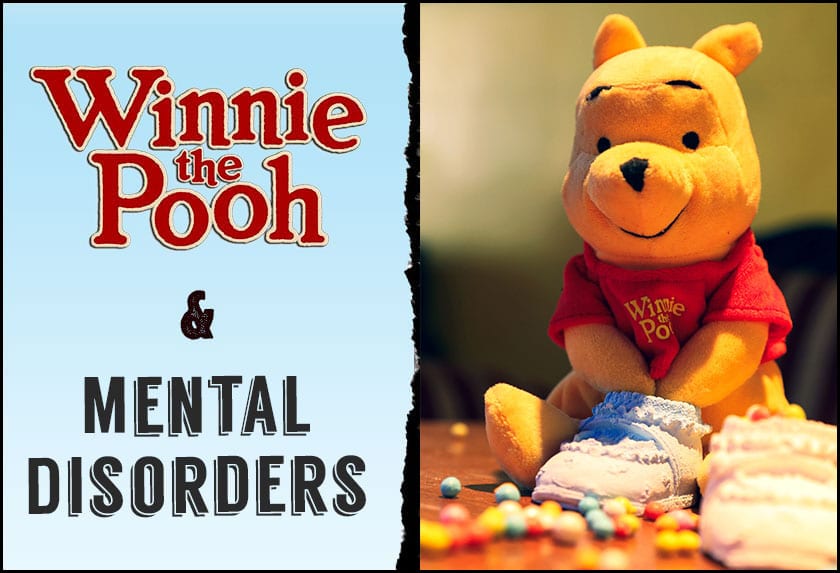Winnie The Pooh: Mental Health & Disorders Explained
Could the inhabitants of the Hundred Acre Wood, those cherished figures from our childhoods, actually be reflections of the complex spectrum of mental health conditions? The "Winnie the Pooh Mental Illness Theory" proposes that each character in A.A. Milne's beloved story embodies a distinct mental disorder, a concept that, upon closer examination, reveals surprising depth.
From the perpetually gloomy Eeyore to the irrepressibly energetic Tigger, each character in the Winnie the Pooh ensemble possesses a unique and readily identifiable personality. Milne's storytelling, though intended for children, inadvertently created a cast of characters whose behaviors resonate with patterns observed in real-world psychological conditions. This has led to a fascinating exploration of the Hundred Acre Wood through a psychological lens, sparking conversations about mental health that might otherwise have been difficult to initiate.
| Character | Proposed Mental Disorder | Key Traits & Behaviors |
|---|---|---|
| Winnie the Pooh | Eating Disorder (potentially Bulimia) and ADHD | Insatiable hunger, obsession with food (honey), difficulty focusing, impulsivity, possible binge eating. |
| Piglet | Generalized Anxiety Disorder (GAD) | Chronic worry, fearfulness, timidity, hypervigilance. |
| Eeyore | Major Depressive Disorder (MDD) | Pessimism, low self-esteem, anhedonia (inability to experience pleasure), social withdrawal. |
| Rabbit | Obsessive-Compulsive Disorder (OCD) | Orderliness, excessive planning, perfectionism, repetitive behaviors (e.g., counting, checking), and controlling tendencies. |
| Tigger | Attention Deficit Hyperactivity Disorder (ADHD) | Hyperactivity, impulsivity, difficulty focusing, excitability. |
| Owl | Potential for various disorders including but not limited to, Narcissistic Personality Disorder | Boastfulness, perceived wisdom, and a tendency to overestimate his own knowledge. |
Reference: Canadian Medical Association Journal
- Exploring Sone 436 Unveiling The Viral Phenomenon More
- Missing Mothers Warmth Chapter 3 Jackerman Find Insights Here
The subtle yet impactful manner in which depression is portrayed within the Winnie the Pooh narrative has had a lasting effect on mental health awareness. Milne, in his charming children's story, has actually initiated a larger dialogue regarding mental health issues that covers a wide spectrum. This allows us to find methods to explore the intersection of Winnie the Pooh and mental health.
The characters, with their unique personalities, inadvertently offer children, and adults, a way to consider and learn about psychological conditions. Milne, with his writing approach, may not have deliberately given his characters the intricacies of psychological conditions. However, they do represent psychological conditions, whether intended or not.
The initial impression of Winnie the Pooh characters and mental disorders may not seem to align, but the more one reflects on the topic, the more it appears logical. The notion of applying psychological diagnoses to fictional characters may, at first, seem unusual, but it provides a framework for understanding the different ways in which mental health challenges can manifest.
- Monica Barbaro Andrew Garfield Dating History Current Romance
- Polly Holliday Now What Shes Doing After Retirement
Research has also found solid connections between the characteristics of Winnie the Pooh characters and mental health disorders. The characters' individual behaviors and traits provide insights into conditions such as anxiety, depression, and OCD.
Stories never explicitly call it out, but their behaviors and the experiences of these characters closely resemble real mental health patterns. Their behaviors mirror real-life mental health patterns, showcasing various traits and behaviors seen in individuals living with mental health challenges.
This article delves into the psychological profiles of these main characters, exploring the mental illnesses they symbolize and the valuable lessons they can teach us about mental health. By introducing these themes in a beloved children's story, A.A. Milne has contributed to a broader conversation about mental health that spans generations.
The Winnie the Pooh characters and their friends made our childhoods enjoyable and full of adventures. But beneath this, there were hidden signs of mental illnesses that they taught us as well.
As with many cartoons, Winnie the Pooh has been the subject of many theories over the years. This article specifically pertains to mental health.
The behaviors of each character in the Hundred Acre Wood reflect the world in their own way. The characters behaviors resemble real mental health patterns, which makes it possible to analyze each character and link them to a mental illness.
Winnie the Pooh's behavior has been linked to eating disorders, while Piglet exemplifies an anxiety disorder, and Eeyore represents major depressive disorder. Rabbit embodies obsessive-compulsive disorder, exhibiting an obsession with order and routines. Tigger's boundless energy and impulsivity could be indicative of ADHD.
The characters of Winnie the Pooh, when studied by Dr. Kevin Gordon and associates, suggested that each one could be linked to a specific psychiatric diagnosis. These findings highlight the potential of these characters to represent complex psychological conditions, even if not explicitly intended by the author.
Winnie the Pooh, the lovable bear with an insatiable appetite for honey, is a character that has captured the hearts of generations. His obsession with honey and the repetitive rituals he performs, like knocking on doors or counting, are indicative of an eating disorder, and attention deficit hyperactivity disorder (ADHD).
The "Pooh pathology test" and the "Winnie the Pooh depression test" have undeniably made a significant impact on mental health awareness and education. By using beloved characters to represent various mental health conditions, they have opened up new avenues for discussion and understanding.
Do any of these Winnie the Pooh mental disorders and their symptoms describe you or someone you know? If so, it might be time to seek help and treatment.



Detail Author:
- Name : Elisabeth Feeney Jr.
- Username : dpowlowski
- Email : rico32@ohara.biz
- Birthdate : 1977-03-20
- Address : 859 Sister Summit Suite 964 Port Mia, KY 29710
- Phone : (810) 849-8510
- Company : Tromp LLC
- Job : Talent Acquisition Manager
- Bio : Aut perferendis aut error porro vitae. Veniam totam est beatae autem est in tempore. Dicta sit nisi deleniti ex eos. Quos iusto pariatur sint minima omnis qui ea ad.
Socials
tiktok:
- url : https://tiktok.com/@chadrick4794
- username : chadrick4794
- bio : Facilis saepe amet in quam fuga eos hic.
- followers : 5005
- following : 1216
twitter:
- url : https://twitter.com/chadrick_official
- username : chadrick_official
- bio : Commodi consectetur tenetur dolor occaecati fugit sed est. Adipisci qui ipsa occaecati. Esse quis libero dolores ducimus ducimus at dolorem.
- followers : 1363
- following : 731
instagram:
- url : https://instagram.com/ckoch
- username : ckoch
- bio : Nihil perspiciatis ad ut architecto nobis. Voluptatem ipsa et adipisci ut eos perspiciatis libero.
- followers : 199
- following : 2200
facebook:
- url : https://facebook.com/chadrick5819
- username : chadrick5819
- bio : Odit quo earum repellat.
- followers : 3799
- following : 2152
linkedin:
- url : https://linkedin.com/in/koch1986
- username : koch1986
- bio : Eum et dolore rerum blanditiis.
- followers : 875
- following : 1891